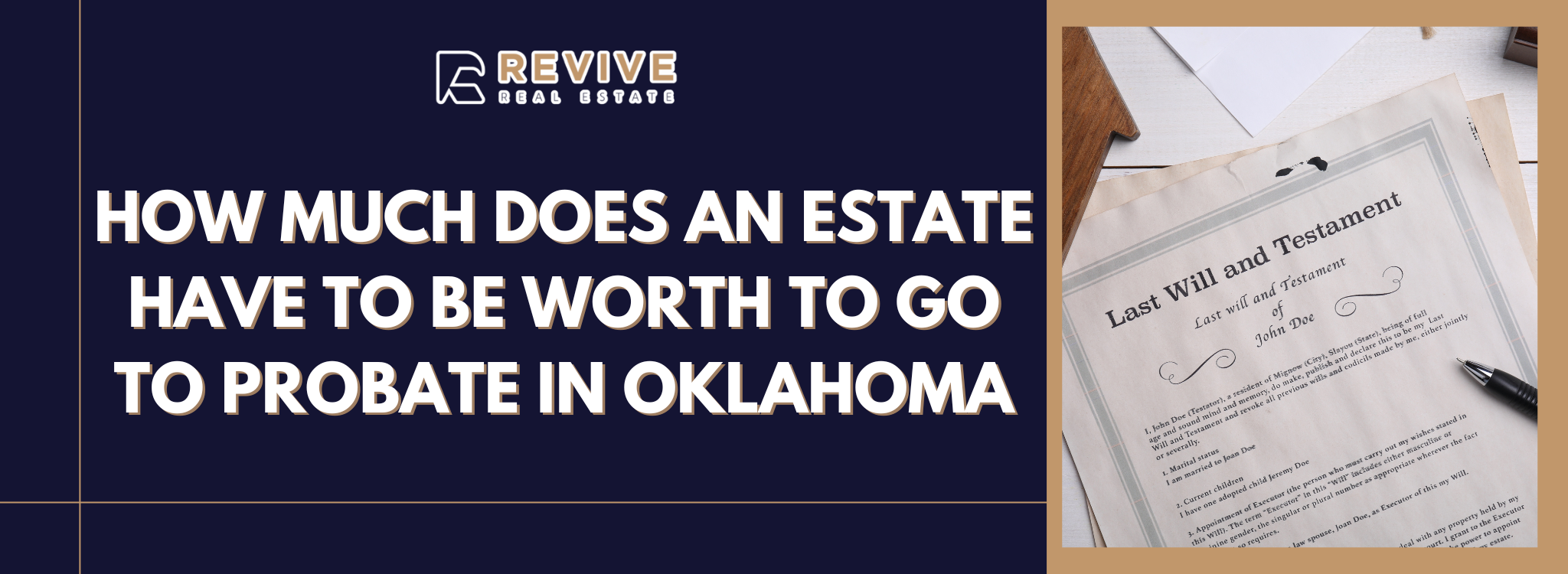
How Much Does an Estate Have to Be Worth to Go to Probate in Oklahoma?
What Determines Whether an Estate Needs Probate?
The probate process in Oklahoma hinges on the type and value of the assets in the estate. Probate is the court process to settle the estate of a deceased person, including the estate’s debts and asset distribution as per the will or intestacy law. In Oklahoma, probate is needed in cases with real property as part of the estate or significant value financial assets. Recent changes in Oklahoma probate laws may impact the influence of probate for smaller cases.

Is There a Minimum Value for Probate in Oklahoma?
Oklahoma has laws setting certain boundaries to determine if probate is necessary. An estate is valued at slightly over $50,000. Then it is eligible for a simpler form of probate called a “small estate affidavit.” This simplifies process enables heirs to avoid full probate court. Although, this concept has some limitations. In any case, it is better to get the help of a probate lawyer to shed light on such matters.
How Does the Value of Assets Affect the Probate Process?
The value of an estate greatly influences the Oklahoma probate process. Higher value estates often mean more detailed administering of probate with additional estate appraisal and higher probate costs. This increase is less common with estates of lower value which are more likely to qualify for simplified processes which allow for less complicated asset distribution. Understanding the impact of asset valuation during probate improves estate planning. To navigate the legal systems effectively, it is essential to understand the processes for probating assets.
For estate planning and probate law in Oklahoma, contact Revive Real Estate, LLC today. We provide consultations to make certain your estate affairs are appropriately handled.
Avoiding Probate in Oklahoma

Can Estates Be Transferred Without Probate?
In Oklahoma, avoiding probate is usually a preferred strategy for estate planning due to the problems probate presents. One method is through the use of “transfer on death” deeds for real property. Moreover, accounts such as retirement accounts or life insurance policies, where beneficiaries are designated, are considered non probate assets and can be transferred easily. In Oklahoma, certain assets are subjected to probate exclusions, which simplifies transfers.
What Are the Options to Bypass Probate?
In Oklahoma, there are numerous ways to avoid probate that include:
- Trusts: Establishing a living trust for a person eliminates the need to go to probate court, as all assets are held in the trust.
- Transfer on Death Deeds: This allows for a beneficiary to be designated so that the property in question is transferred seamlessly upon the death of the owner.
- Joint Ownership: For property held in joint ownership with right of survivorship, upon the death of the owner, the property automatically transfers to the other joint owner.
These probate avoidance strategies can help simplify an estate plan, which can be especially beneficial in Oklahoma.

Are There Any Exemptions for Small Estates?
Yes. Oklahoma allows small estates to bypass the formal probate process. While the probate process is necessary for administrative purposes in larger estates, in the case of smaller estates, the process is significantly streamlined. As long as the assets value does not exceed the defined threshold, an estate is eligible to be claimed via an affidavit. Heirs in Oklahoma face lesser value thresholds as compared to the majority of other states.
The use of small estate affidavits greatly reduces the time and work needed relative to the probate process in Oklahoma. If you would like to know your eligibility for other probate exemptions in Oklahoma, reach out to an attorney for advice tailored to your case.
Revive Real Estate, LLC remains ready to aid you anytime in estate and succession planning.
Understanding the Costs Involved in Probate

What Are the Typical Fees for Probate in Oklahoma?
When dealing with probate in Oklahoma, knowing the costs involved is important. You will encounter probate fees, which are the court charges for handling the estate. Additionally, there are legal fees for hiring an attorney, which can vary based on the case’s complexity and the lawyer’s experience. The probate court may also charge administrative fees. Generally, attorney fees and costs related to probate administration make up a large part of Oklahoma probate costs. It’s wise to consult a professional for a detailed estimate tailored to your situation.
Are There Additional Expenses Involved in the Probate Process?
Besides standard fees, you might face additional expenses during probate in Oklahoma. These could include charges for legal services beyond routine tasks, like resolving disputes or managing complex assets. Expenses from the Oklahoma probate court might involve court filing fees, publication costs for public notices, and appraisal fees for estate assets. You might also encounter other costs related to estate settlement in Oklahoma, such as taxes or debts owed by the deceased. Knowing these possible expenses can help with effective planning and budgeting.

How Can Probate Costs Be Minimized?
Minimizing probate costs involves strategic planning. Simplifying the probate procedure through careful estate planning, such as setting up trusts, can limit the need for probate. Understanding the legal framework and potential probate exemptions in Oklahoma can also reduce expenses. Working with a knowledgeable attorney through the legal process helps ensure all cost-cutting opportunities are used. Consulting legal professionals about strategies to minimize probate costs is an invaluable step in effective estate management.
The Role of Executors and Beneficiaries

What Are the Responsibilities of an Executor?
The executor or personal representative holds notable importance in estate probate administration. The executor of an estate has certain assigned responsibilities known as estate administration, distributing the estate’s properties, settling any debts, and dealing with the estate’s legal work. Along with other responsibilities, the executor has specific duties under Oklahoma law, which include:
- Probate Kickoff: Initiating probate and submitting the necessary documents to the corresponding court.
- Inventory Assignment: Collection and creation of the lists of the deceased’s assets and liabilities.
- Probate Estate Supervision: Proper care and management of the estate’s assets that are in probate court.
- Inheritance Tax Counters: Settling any tax obligations, including inheritance tax obligations, the estate may incur.
- Succession Asset Distribution: Allocating assets to the beneficiaries as described in the last will or according to intestate succession.
The executor must also ensures compliance to legal requirements.
How Do Beneficiaries Receive Their Inheritance?

In Oklahoma, as in many other places, court order is required before the inheritance can be released to the beneficiaries, and the plan put forth by the executor is shared equally among the beneficiaries. In Oklahoma, things might be different. This is how it usually goes:
- Initiating Probate Procedures: it is the executor’s duty to initiate the probate proceeding and confirm the will.
- Notice to Beneficiaries: the beneficiaries of the estate are informed about the progress of the case as well as their interests in the estate.
- Assessment of the Estate and Claim Adjustment: the executor ascertains the estate’s worth and resolves any outstanding claims.
- Assessment of the Estate and Claim Adjustment: the executor ascertains the estate’s worth and resolves any outstanding claims.
- Distribution of Assets: distribution of estate assets is undertaken after the court gives its consent. Distribution happens according to the will, and in absence of will, according to the applicable estate laws.
Having an idea of the rights and processes regarding estate distribution assists in guaranteeing the inheritance is transferred with minimal hitches.
Can Executors Be Compensated for Their Duties?

Given the amount of time and resources an executor allocates to an estate, he or she is entitled to compensation for the executor’s work. In Oklahoma, executor compensation is as follows:
- Executor Payment: Specified in the Last Will and Testament, or set by law based on the estate’s size and complexity.
- Claim for Payment of Expenses: Payment of reasonable expenses incurred in the course of estate management is paid to the executor.
- Approved by the Judge Payment: In certain instances, the probate court’s permission is necessary for payment to the executor, especially if the other beneficiaries do not consent.
Executor and beneficiaries of the estate may have a different understanding of probate fee.
Legal Assistance and Resources for Probate in Oklahoma
When Should You Consult a Probate Attorney?
The probate process in Oklahoma can be complex, requiring a solid grasp of probate law. It’s wise to consult a probate attorney when managing probate procedures to ensure the legal process is done correctly. A probate attorney in Oklahoma offers help with:
- Understanding the details of probate court procedures.
- Providing information on attorney fees and affordable legal services.
- Ensuring compliance with state probate laws.
Consulting a probate attorney helps make the probate process smoother and avoids costly errors.
What Resources Are Available for Estate Planning in Oklahoma?
Estate planning is essential for managing your assets and ensuring they are distributed according to your wishes. In Oklahoma, there are several resources to assist in creating effective estate plans:
- Wills and Trusts: Setting up a will or trust can help avoid probate and make estate settlement easier.
- Probate Exemptions: Learning about probate exemptions in Oklahoma can reduce legal challenges.
- Educational Materials: Many books and online resources explain probate laws in Oklahoma and offer estate planning advice.
These resources help individuals create an estate plan that aligns with their wishes while meeting local laws.
Where Can One Find Additional Help and Guidance?
For those needing further assistance with probate administration in Oklahoma, consider these options:
- Oklahoma Bar Association: This is a reliable source for finding qualified probate attorneys and provides extensive information.
- Consultation Services: Schedule a consultation with a legal expert to receive personalized guidance.
- Probate Checklist: Use a probate checklist to organize tasks related to estate settlement and probate court proceedings in Oklahoma.
Revive Real Estate, LLC encourages individuals to seek professional advice and explore these resources for navigating the probate process effectively. For more information or to consult with a probate attorney, please contact us directly.
FAQs:
What are the probate requirements in Oklahoma?
In Oklahoma, probate is typically required if an estate’s value exceeds $50,000. Exceptions exist for assets held in trust or with designated beneficiaries. It’s advisable to consult a probate lawyer to understand your specific situation.
How long does the probate process take in Oklahoma, and what factors influence the timeline?
The probate process in Oklahoma usually lasts six months to a year, influenced by factors such as estate complexity, disputes among heirs, and court scheduling. Proper planning and having necessary documents ready can expedite the process.
Can an estate avoid probate in Oklahoma, and if so, how?
Yes, you can bypass probate in Oklahoma by using living trusts, jointly owning properties, or naming payable-on-death (POD) beneficiaries on accounts. These measures ensure assets transfer directly to beneficiaries without probate.
What role does a probate judge play in Oklahoma’s probate process?
A probate judge oversees the legal proceedings for distributing an estate’s assets. They ensure debts and taxes are paid and distribute remaining assets according to the will or state laws if no will exists.
Are there estate tax implications during probate in Oklahoma?
Oklahoma does not have an estate tax, but federal estate taxes may be applicable if the estate’s value exceeds the federal threshold. Consulting a tax advisor can clarify any tax responsibilities.
What is the homestead exemption during probate in Oklahoma?
The homestead exemption protects a primary residence from being used to settle the deceased’s debts during probate. This ensures the surviving spouse or minor children can retain the home despite outstanding debts.
What is summary administration, and when is it applicable in Oklahoma probate?
Summary administration is a simplified probate process for smaller estates or those with few creditors. It offers a quicker, cost-effective way to manage an estate in Oklahoma if specific conditions are met.
Who is responsible for managing an estate in probate in Oklahoma?
An executor, or personal representative, manages an estate during probate. Named in the will, this person is responsible for settling debts, filing paperwork, and distributing assets to heirs.
Key Insights
- In Oklahoma, understanding the minimum estate value for probate is essential. Estates that bypass probate can be settled more efficiently through designated beneficiaries or jointly owned assets.
- Estate taxes and Oklahoma probate requirements differ, impacting how estate funds are distributed, especially with real estate probate or mobile homes.
- Probate costs and processes in Oklahoma, including filing timelines and court proceedings, often raise questions about creditor claims and the statute of limitations. Consulting a probate lawyer can help manage these complexities.
- Clarifying probate myths and legal procedures is important, particularly in Oklahoma County or Oklahoma City, where local laws like community property laws or dower rights can affect estate planning.
- Understanding guardianship, sibling inheritance, and next-of-kin laws in Oklahoma ensures smoother estate distribution, reducing stress for loved ones and supporting effective pre-probate planning.
- Changes in Oklahoma probate law can impact probate property management, executor responsibilities, and deadlines. Staying informed through trusted news sources or legal consultations is crucial.
- Beneficiary designations, Transfer on Death (TOD) accounts, and naming representatives play key roles in bypassing probate, simplifying the legal process, and cutting unnecessary costs.
- The homestead exemption in Oklahoma and estate tax rates are vital components of comprehensive estate planning, particularly for those inheriting without a will.
- Legal professionals in Houston, Denver, or other areas can benefit from a detailed probate checklist and an understanding of Oklahoma intestacy laws to provide clients with thorough advice and support.
- Collaborating with an expert team on matters like probate bonds, real estate probate, and administration can effectively address personal representative duties and estate distribution challenges.
This information applies to Oklahoma and its cities, including Oklahoma City, Tulsa, Enid, and more. For assistance or questions, please call us at (405) 669-6466 or visit our website at Revive Real Estate, LLC for more details.
Additional Resources For Oklahoma Sellers


